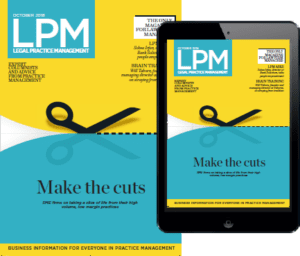
All-in-one technology integration once and for all
Alex Williams, product manager at Advanced, says law firms need a single technology suite and tech integration to stay ahead of the competition and to bring benefits to their clients.
The legal technology sector continues to amaze me: despite all the current challenges, the industry is still in a hugely innovative and varied state. Firms these days can choose digital solutions for every corner of their operation, from among hundreds of different providers, all offering a vast array of options like a pick-and-mix stand at the cinema (if they were still open). But so many of these providers specialise in only one or two areas – there comes a point where firms can be faced with operating as many as 10 different solutions at one time.
All law firms, large or small, need to start thinking about the benefits of using one provider for all their legal technology. Firms would reap immediate benefits from a suite of systems that intuitively speak to one another and don’t require any messy, sometimes time-consuming, manual integrations.
It also might sound trivial but, actually, having only one point of contact for all your technology needs would save your firm’s people a lot of time in the long run. In the remote-working world, who would say ‘no’ to having as few emails and calls as possible?
A single software suite would also allow any individual at your firm to have a complete overview of a given client’s journey – supporting exceptional customer service, whoever the client talks to. An online portal that’s integrated with your CRM software and automatically updates your clients on case-progress with information straight from your practice and case management systems would also enable you to deliver precise communications – and drastically improve your clients’ experience. And, as we all know, law firms that can understand and improve their clients’ experience will undoubtedly stay ahead of their competition.
But to do that, firms’ technology support also needs to be prepared for change. We need only look at how rapidly legal technology has advanced in the last five years to see how important it is to understand, and invest in, a solution with a solid product roadmap. As methods of working and communicating with clients evolve, your firm will need a solution that adapts to change at the same pace as your firm does.
Ultimately, implementing this single-system strategy would save your firm time and operating costs, help you better satisfy your clients’ needs and, internally, benefit your staff through integrated HR and payroll tools – all of which would be built into the same platform you use for forms, accounts, dictation and case management.
Will AI finally kill the billable hour? The rise of value-based pricing

Is your PMS holding your SME law firm back?

How does digital influence client experience?
Alex Williams, P4W product manager at Advanced, discusses the impact digital ways of working and digital tools have on the all-important client experience
Even before the pandemic arrived in the UK, the legal community was becoming increasingly aware of how a client’s experience of the firm drives new and recurring business. It matters now more than ever because sites such as Google Reviews and Review Solicitors give prospective clients an immediate understanding of what previous clients have experienced at your firm. As we adjust to living with Covid-19, firms should now be thinking about the steps they can take to improve their customers’ experience, ensure positive reviews, and nurture lasting relationships.
The client journey begins with the onboarding process. Since it’s no longer a good idea to do that in person, firms need to put a digital process in place that will allow client cases to be set up quickly and easily – without social distancing being an issue. The UK Government’s Digital First policy fully supports this approach by enabling identity checks to be done digitally. It’s something that many firms do already, but digital onboarding will increasingly become the norm for consumers.
Once onboarded, it’s important that a single source of truth is rigorously maintained while managing the client’s case history and activity. The right practice and case management system enables that by ensuring that all client information is stored in one place. It means that everyone in the firm – from the receptionist to the accounts team – has access to role-appropriate real-time information, so that they’re always on the same page with the client’s case. Ultimately this increases the quality of the client’s experience across every interaction with the firm.
It may sound obvious, but communicating with clients regularly, and in the right way, also improves their customer journey. People don’t like being left in the dark, and, in particular, clients don’t want to have to chase for progress updates. One way to help clients take back control is by using a client collaboration portal that gives them access to their case details digitally. Our solution is called WebPortal. Being able to divert clients to this type of online resource both provides clients with the information they require and ensures that you staff’s time is used productively.
Finally, closing a case shouldn’t mean that you end communications with the client. It’s a fundamental principle of business that it’s far easier and cheaper to keep or renew a client than to find a new one. By communicating regularly, you’ll keep clients engaged and remind them that you’re still there for them when they need you. However, this can be time-consuming. An integrated client relationship management system can automate this process, keeping you on track with client engagement.
Advanced is hosting a webinar series, elaborating on the points discussed here, and offering top tips for choosing a practice and case management system in 2020. It’s designed to help you know what to consider when you’re ready to make the move. Register here to take part.
Will AI finally kill the billable hour? The rise of value-based pricing

Is your PMS holding your SME law firm back?
Most Popular

Where are the challenges for SME law firm leadership changing?

The leading annual picture of SME law firms' changing strategic priorities
TA Triumph-Adler provides tailored support to meet compliance requirements

Law firms undertaking identity verification checks must register as an ASCP

Robust onboarding processes are fundamental to effective risk prevention

Osprey Approach's webinar explores the benefits of a digital-first approach

Lessons learned in 2020: why having a competent PMS is vital
Alex Williams, P4W product manager at Advanced, says SME law firms are waking up to just how important having an agile and efficient practice or case management system is in order to navigate these troubling times.
So far, 2020 has been an exceptionally challenging year for law firms. The global pandemic has now forced many firms to bring forward the plans they had to digitalise their practice.
And mobility and accessibility have become essential in navigating government social distancing guidelines. Choosing the right practice and case management software is vital now more than ever – especially if firms want to operate through these exceptional times and build on these foundations to survive in the new working world.
Your case management system should allow you to scan documents, or post into it directly, and then allocate those files out to fee earners for review – thus creating a fully digital process. Something like this is critical right now, and we’ve had a lot of clients heavily utilise our feature within our own practice and case management solution, Postroom. During the pandemic where many of us, if not all, have been working from home – firms may have had a skeleton team attend the office who scan post and allocate accordingly. Many paper-driven teams are now giving it up all together. This solution is not only more efficient, but also saves a lot of money.
Something else that’s important to make use of right now is the use of e-signatures, which are even more prevalent now with the latest news from HM Land Registry. Being able to email documents to clients and receiving a signature back within minutes, if not a couple of hours, not only saves a huge amount of time, money, and resource but also demonstrates to your client-base that you’ve modernised (something the younger generation actively seek out in businesses). Since many people aren’t in offices right now, this ensures less post has to be monitored too, with the result being filed automatically back in the digital case file and notifying the responsible fee earner of the receipt.
Communication of case progress remains the top complaint from clients, so by ensuring that your practice and case management provides the ability for instant chat and notifications to update your clients is vital – even more so where attending offices is at a reduced level. Consumers are becoming increasingly used to logging onto apps and getting information quickly, so this again meets the efficiency they desire.
Choosing the right PMS
Advanced listens to what your clients want and provides you with the tools to meet their demands, with an efficient, integrated practice and case management solution. Advanced is hosting a panel discussion on 30 September at 12pm, with key industry experts and some of our own practice and case management software users to explore in more detail why choosing the right practice and case management system in 2020 is so important for law firms. Sign up now.
Will AI finally kill the billable hour? The rise of value-based pricing

Is your PMS holding your SME law firm back?
Most Popular

Where are the challenges for SME law firm leadership changing?

The leading annual picture of SME law firms' changing strategic priorities
TA Triumph-Adler provides tailored support to meet compliance requirements

Law firms undertaking identity verification checks must register as an ASCP

Robust onboarding processes are fundamental to effective risk prevention

Osprey Approach's webinar explores the benefits of a digital-first approach


